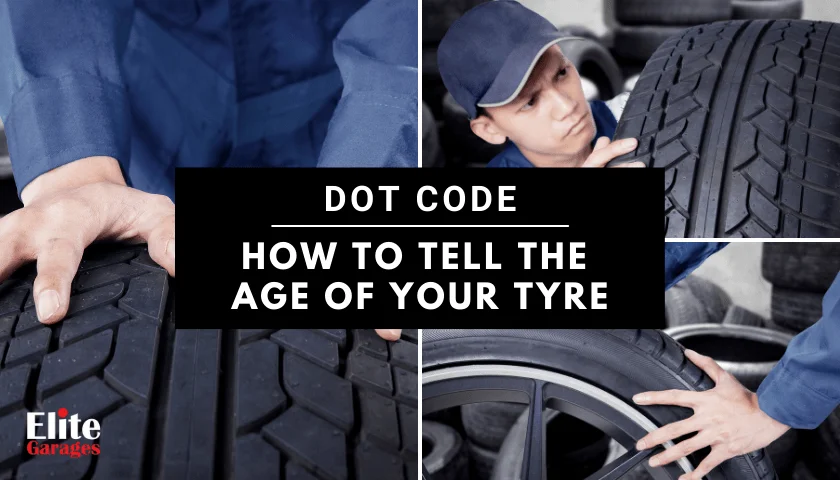
How To Tell The Age Of Your Tyre
October was Tyre Safety Month but that doesn’t mean we have to stop focusing on it. The truth is, every motorist should keep in mind all year-round and tyre age plays an important part. With that in mind, if you want to know the answer to a common question of “how long to tyres last”, you’ve come to the right place.
Even if your car tyres don’t show much wear after a few years, they are only considered “new” for up to 5 years from the date of manufacture. Based on that statement, it’s good to know what the tyre age is and not simply rely on a visual tyre inspection. One way to answer “how long do tyres last” is using the DOT code and here, we explain it in detail.
What Is The DOT Code?
Every tyre has an imprinted DOT code on the sidewall which is short for the Department of Transportation. The DOT code consists of numbers and letters indicating the place and date of the tyre’s manufacture.
It was first introduced on 26th January 1971 and called The Tire Identification Number but it’s more commonly known in the UK as the ‘DOT code’. The purpose was “to facilitate notification to purchasers of defective or non-conforming tyres, … so they may take appropriate action in the interest of motor vehicle safety.”
Since the 1st of February 2021, UK Construction and Use Regulations do not permit the use of tyres older than ten years fitted on front steered axle(s) of heavy goods vehicles, buses and coaches. This also applies to all tyres in a single configuration on minibuses and all tyres on these vehicles are required by law to display a legible date code.
Using The DOT Code To Determine Tyre Age
All of this is based on the date of manufacture part of the Tire Identification Number. It was created to provide unique batch codes to better facilitate product recalls. The full Tire Identification Number, from left to right includes the following:
- The three-character plant code represents the identity of the new tyre manufacturer or retreader
- The six-character manufacturer’s code is only used on new tyres and not retreads
- The date code consisting of four digits indicates the week and the year of manufacture. The first and second digits represent the week while the third and fourth indicate the decade and year respectively.
In this instance, the calendar week is from Sunday to the following Saturday so 0319 means the tyre was manufactured in the third calendar week of 2019, or the week beginning on Sunday, January 13, 2019, and ending on Saturday, January 19, 2019.
How To Identify The Place Of Manufacture Using The DOT Code
The best way to determine tyre age and where they were manufactured is using the DOT code. We’ve already covered the four-digit code indicating month and year of manufacture but what about the place of manufacture?
The place of manufacture is indicated by the phrase “MADE IN …” which you can also find on the tyre sidewall. Digits directly after the DOT code indicate the factory that manufactured the tyre. Listed below are a few example codes indicating the place a tyre was manufactured and here you can find the complete list of DOT plant codes.
- 1E2 – BRIDGESTONE DO BRAZIL INDUSTRIAL E COMERCIO LTDA – Brazil
- 122 – LLC MICHELIN RUSSIAN TYRE MANUFACTURING CO. – Russia
- 236 – TITAN TIRE CORP. OF TEXAS – United States
- 1E5 – FIRESTONE SOUTH AFRICA (PTY) LTD. – South Africa
- 15E – MANFACTURE FRANCAISE DES PNEUMATIQUES MICHELIN – France
- 1AE – GENERAL FABRICA ESPANOIA DEL CAUCHO S.A. – Spain
Does Tyre Age Matter?
Considering the amount of work car tyres perform, it should come as no surprise that they have an expiration date. Regardless of the car you drive, tyre age is vital for several reasons; none more so than safety.
If your tyres are 5 years old and you have stored them properly, they can be considered as “new.” However, tyre age depends on several factors such as journey types, load, the quality of the suspension system and personal driving habits.
Even when stored properly, the natural ageing process of rubber continued during storage but you can minimise it following these tyre storage tips.
- Avoid continuous exposure to direct sunlight
- Keep tyres free of stress stored in vertical positions such as special racks to prevent deformation
- The best climate to store tyres is at room temperature without sudden fluctuations
- Minimise moisture by storing tyres in well-ventilated or air-conditioned rooms
How To Tell You Need New Tyres
Many customers want to know how long tyres last under normal circumstances but it is often a difficult question to answer. As mentioned in the previous section, tyre longevity depends on various factors including incorrect tyre pressure, improper wheel alignment and driving style.
While tyre age can be determined using the DOT code, it’s important to know the signs that you may need new tyres. Uneven tyre wear is often the first sign that you may need new tyres but you also need to pay attention to the following:
- The vehicle dragging or pulling to one side
- Vibration on the steering wheel
- A sawtooth appearance on the edges of the tyre
- Faster tyre wear on the outer edges than in the middle
- Faster wear of front or rear tyres on front-wheel-drive cars
- Excessive tyre wear on one side
- Cups or dips in the tread
Quality Tyres And Services At Elite Garages
If the DOT code indicates that a tyre is older than 5 years, it should be thoroughly inspected as it might be cracked or damaged due to UV exposure among other factors. Even if the tyre has a good amount of treat left, an old tyre is more prone to failure and may need replacing. Depending on how much you drive, you should replace a new set of tyres every few years or 20,000 miles. Avoid driving on tyres that are older than 10 years even if they don’t appear to be worn.
Also, make sure you replace a tyre once you’ve had a puncture on the outside of the tyre as it could have affected the internal structure. If you notice uneven tyre wear or are concerned about your tyre age, contact your nearest Elite branch as soon as possible. You can request a free tyre check where our expert technicians look at everything in great detail. If they identify any possible issues, they will provide a detailed report and recommend the next steps.
About Us
Opening Times
Saturday : 8:30–4:00
Sunday : closed
More Information
Contact UsCustomer Information Pack
Check MOT Due Date
Free MOT reminder
Careers



